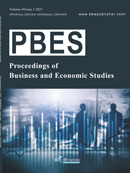Abstract
This study selected 473 local research articles on executive compensation from core journals in the China Academic Journals (CNKI) full-text database and the Chinese Social Sciences Citation Index (CSSCI) from 2003 to 2020. Then, the bibliometric analysis method was adopted and conducted in regard to the number of articles published, authors, research institutions, high-frequency keywords, etc. In view of the increasing studies of this field, this study showed that a few scholars and institutions with high academic influence have been involved in the research on executive compensation gap in China. The results from this study revealed that the research on the relationship between executive compensation gap and firm performance as well as the moderating variables between them were topics of interests. In the context of the increasing compensation gap which had become a global interest, the research on management power and promotion incentives have established their significance as important research frontiers.
References
Zhao Q, Wang Y, 2019, World Economy. 42(07): 94-119.
Li W, Yang, 2005, Motherland. Journal of Information Science, (01): 68-70, 143.
Gao Z, Wang C, 2018, Analysis of biomechanical changes and characteristics in running process based on knowledge graph. Chinese Journal of Tissue Engineering Research, 22(36): 5879-5888.
Chen Y, Zhou T, 2016, Visualization analysis of domestic network public opinion governance research: based on scientific knowledge graph. Information Science, 34(11): 101-106.
Zhang X, Zhu JW, 2015, Interaction between pay gap and firm performance in listed companies: based on panel data analysis of electronic communication industry. Accounting Communications, (36): 53-56, 129.
Lu H, 2009, Research on executive compensation gap and firm performance from the perspective of endogenous. Soft Science, 23(12): 22-29.
Shi Y, Yang H, 2013, An empirical study on the impact of internal and external compensation gap on the future performance of top management teams. Economic Journal, (01): 104-108.
Gao L, Lu J, 2015, Research on the asymmetric incentive effect of internal pay gap: a threshold panel model based on the data of manufacturing enterprises. China Industrial Economics, (08): 114-129.
Lv J, 2014, Heterogeneous firms, pay gap and firm performance. Journal of Finance and Economics, (01): 71-79.
Li C, Gao Y, Yu H, 2013, The impact of internal income gap on corporate performance: an empirical analysis based on the annual data of listed companies in 2013. Inner Mongolia Social Sciences, 36(06): 97-103.
2015, The relationship between internal and external executive pay gap and firm performance: an empirical study. Enterprise Economics, (04): 127-130.
Wei G, Li K, 2014, An empirical study on the relationship between executive-employee pay gap and business performance in listed companies. Corporate Economics, (03): 51-55.
2010, A study on the relationship between salary gap and performance in top management teams. Population and Economics, (S1): 49-50.
Li Y, Liao Q, 2015, Management power, firm performance, and pay gap: based on the data of state-owned listed companies. Accounting Communications, (21): 57-60.
Liu B, Zhou W, Zhang H, 2016, High salary does not necessarily improve honesty - based on the perspective of power alienation. China’s Economic Issues, (06): 82-95.
Yang Z, Wang H, 2014, Internal pay gap, ownership concentration and earnings management behaviors: a comparative analysis of compensation within executive team and between executive and employee. Accounting Research, (06): 57-65, 97.
2014, Managerial power, executive human capital incentives, and firm performance. Financial Theory & Practice, 35(06): 96-102.
Li W, Cen Y, Hu Y, 2014, An empirical study on the management market and property rights of listed companies in China. Nankai Management Review, 17(04): 24-35.
2015, The relationship between internal and external executive pay gap and firm performance: an empirical study. Enterprise Economics, (04): 127-130.
Zhang H, Zhang L, 2016, Property rights difference, promotion incentive and enterprise risk taking. Economic Management, 38(05): 110-121.
Zhang H, Zhang L, 2017, Executive promotion incentive and financial fraud - empirical evidence from listed companies. Economic Management, 39(04): 176-194.
Zhang H, Zhang L, 2018, Executive promotion, incentive direction and internal control quality. China Certified Public Accountants, (02): 52-57.
Zhang H, Wang J, Miao L, 2017, A study on the relationship between promotion incentive and salary incentive and overinvestment of institute-owned enterprises. Business Research, (06): 131-136.
Kang H, Hu W, Wu Z, et al., 2016,. Research Management Journal, 37(10): 51-59.
Li Z, 2017, Executive motivation and firm performance: the mediating effect of R&D investment. Accounting Bulletin, (35): 31-36, 129.
